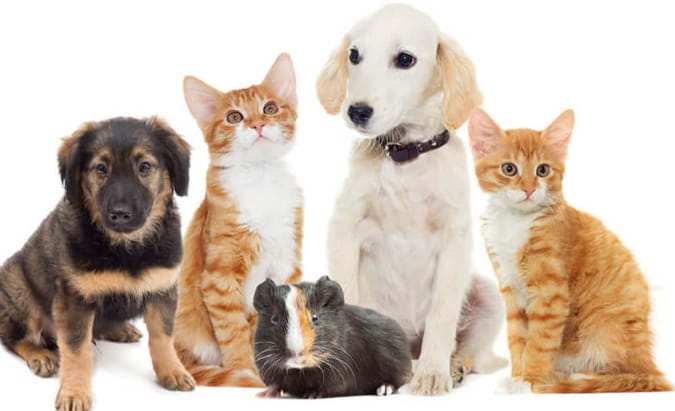
From Furry Friends to Feathered Companions: Exploring Different Pet Types
From furry friends like cats and dogs to feathered companions such as parrots and canaries, the world of pets offers diverse options for every kind of family and lifestyle. This article explores different pet types, their unique characteristics, and the joys and challenges they bring to enrich our lives.
🐶 Pet Star
14 min read · 25, Jan 2025

1. Dogs: Loyal and Loving Companions
Dogs, often called man’s best friend, are one of the most popular pets worldwide. Their loyalty, affection, and playful nature make them excellent companions for people of all ages. Dogs come in various breeds, each with its personality and care requirements.
Benefits of Owning a Dog:
- Dogs provide emotional support and reduce stress.
- They encourage an active lifestyle through regular walks and play.
- Certain breeds, such as Labradors and Golden Retrievers, are known for their gentle temperament and are great with children.
Challenges:
- Dogs require significant time and effort for training, grooming, and exercise.
- Veterinary care and proper nutrition can be costly.
2. Cats: Independent and Affectionate
Cats are adored for their grace, curiosity, and playful antics. They are relatively low-maintenance compared to dogs, making them ideal for busy individuals or small living spaces.
Benefits of Owning a Cat:
- Cats are independent and require less attention than dogs.
- They are excellent at reducing anxiety with their calming presence.
- Grooming needs are minimal, especially for short-haired breeds.
Challenges:
- Cats can be picky eaters and may require special diets.
- Their independent nature might not appeal to those seeking a highly interactive pet.
3. Birds: Colorful and Talkative Companions
Birds, such as parrots, canaries, and budgerigars, are popular for their vibrant colors and melodic songs. Some bird species can even mimic human speech, making them engaging companions.
Benefits of Owning Birds:
- Birds are social and can be trained to interact with their owners.
- They require less space than dogs or cats.
- Their songs and chirps bring life to any home.
Challenges:
- Birds can be noisy, which might not suit all households.
- They require regular cleaning of their cages and specialized diets.
4. Fish: Tranquil and Low-Maintenance Pets
Aquariums filled with colorful fish create a calming environment in any home. Popular species include goldfish, bettas, and guppies.
Benefits of Owning Fish:
- Fish are low-maintenance and don’t require much interaction.
- They add aesthetic appeal to your living space.
- Observing fish can be therapeutic and reduce stress.
Challenges:
- Maintaining a clean and balanced aquarium requires consistent effort.
- Some exotic fish may have specific temperature and pH requirements.
5. Small Mammals: Cute and Compact
Small mammals like hamsters, guinea pigs, and rabbits are great options for families with limited space. These pets are affectionate and can be handled easily.
Benefits of Owning Small Mammals:
- They are affordable and require less space.
- Small mammals are great for children due to their manageable size.
- They have relatively simple dietary needs.
Challenges:
- Some small mammals are nocturnal and may be active at night.
- Regular cleaning of their cages or enclosures is essential.
6. Reptiles: Exotic and Fascinating
Reptiles like turtles, lizards, and snakes are unique pets that appeal to those interested in the exotic. These pets often require specific habitats and care.
Benefits of Owning Reptiles:
- Reptiles are quiet and low-maintenance compared to other pets.
- They don’t require daily interaction, making them ideal for busy owners.
- Observing their behavior is fascinating for enthusiasts.
Challenges:
- Setting up a proper habitat with heating and lighting can be expensive.
- Not all reptiles are suitable for beginners due to their specialized care needs.
7. Exotic Pets: Unique and Rare Choices
For those seeking something different, exotic pets like hedgehogs, sugar gliders, or tarantulas can be intriguing choices. These pets require careful research and preparation.
Benefits of Owning Exotic Pets:
- They are conversation starters and offer a unique pet experience.
- Many exotic pets require minimal interaction.
Challenges:
- Legal restrictions may apply to certain exotic pets.
- Finding a veterinarian experienced with exotic animals can be difficult.
8. Farm Animals: Beyond Traditional Pets
For those with ample space and a love for the countryside, farm animals like chickens, goats, or miniature pigs can be rewarding companions.
Benefits of Owning Farm Animals:
- They can provide fresh produce, such as eggs or milk.
- Farm animals often have charming personalities.
Challenges:
- They require significant space and proper enclosures.
- Caring for farm animals involves more labor and time commitment.
Choosing the Right Pet
When deciding on a pet, consider your lifestyle, budget, and living situation. It’s essential to research the specific needs of any pet you’re interested in to ensure you can provide a happy and healthy environment for them. Remember, pets are a long-term commitment and deserve the best care you can offer.
Q&A Section
Q1: What pet is best for first-time owners?
Ans: For first-time owners, low-maintenance pets like fish, small mammals (hamsters or guinea pigs), or cats are ideal. They require less effort and are easier to care for compared to dogs or exotic pets.
Q2: Are birds good pets for apartments?
Ans: Yes, birds like budgies or canaries are excellent apartment pets as they require minimal space. However, ensure your neighbors are okay with their chirping.
Q3: What’s the easiest pet to care for?
Ans: Fish and small mammals like hamsters are among the easiest pets to care for. They have simple needs and don’t require constant attention.
Q4: How do I decide between a dog and a cat?
Ans: Consider your lifestyle. If you have an active routine and enjoy outdoor activities, a dog might be a better fit. If you prefer a quieter, low-maintenance companion, a cat is a great choice.
Q5: Are exotic pets safe for children?
Ans: Exotic pets require specialized care and might not be suitable for young children. Always supervise interactions and choose pets appropriate for your child’s age and understanding
Similar Articles
Find more relatable content in similar Articles

How Pets Strengthen Family Bonds...
Pets are more than just compan.. Read More

Smart Homes for Pets: Automated Feeders, Doors, and Mo..
As smart home technology advan.. Read More

How Climate Change Affects Wild and Domestic Animals...
Climate change is dramatically.. Read More

Sustainable Pet Products: What to Look for in 2025...
As sustainability becomes a ce.. Read More
Explore Other Categories
© 2024 Copyrights by rPets. All Rights Reserved.